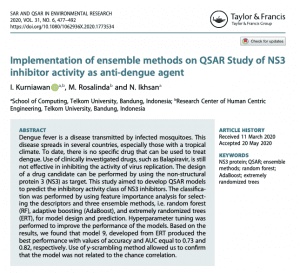Our research article entitled Implementation of ensemble methods on QSAR Study of NS3 inhibitor activity as anti-dengue agent was recently published in SAR and QSAR in Environmental Research.
Abstract
Dengue fever is a disease transmitted by infected mosquitoes. This disease spreads in several countries, especially those with a tropical climate. To date, there is no specific drug that can be used to treat dengue. Use of clinically investigated drugs, such as Balapiravir, is still not effective in inhibiting the activity of virus replication. The design of a drug candidate can be performed by using the non-structural protein 3 (NS3) as target. This study aimed to develop QSAR models to predict the inhibitory activity class of NS3 inhibitors. The classification was performed by using feature importance analysis for selecting the descriptors and three ensemble methods, i.e. random forest (RF), adaptive boosting (AdaBoost), and extremely randomized trees (ERT), for model design and prediction. Hyperparameter tuning was performed to improve the performance of the models. Based on the results, we found that model 9, developed from ERT produced the best performance with values of accuracy and AUC equal to 0.73 and 0.82, respectively. Use of y-scrambling method allowed us to confirm that the model was not related to the chance correlation.

Leave a Reply